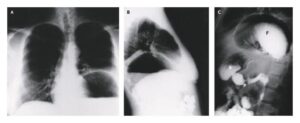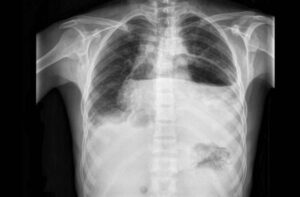A 43-year-old man known to have hepatitis C infection and a long history of alcohol abuse was admitted to the hospital with ascites and edema. For the previous year he had noticed painless enlarged veins on his abdomen.
Examination revealed spider angiomas, palmar erythema, enlarged parotid glands, edema, hepatosplenomegaly, ascites, and an unusually large caput medusae.
Auscultation over the caput medusae revealed a Cruveilhier–Baumgarten murmur. Paracentesis yielded fluid that appeared to be a transudate.
Abdominal ultrasonography revealed cirrhosis, hepatosplenomegaly, ascites, a recanalized umbilical vein, and patent hepatic veins. An abdominal computed tomographic scan showed a 3-mm recanalized umbilical vein with collaterals extending to the abdominal wall.
The ascites responded adequately to moderate doses of oral diuretics. No treatment was deemed necessary for the caput medusae.
During three months of follow-up, the patient’s edema and ascites have continued to respond to oral diuretic therapy.


